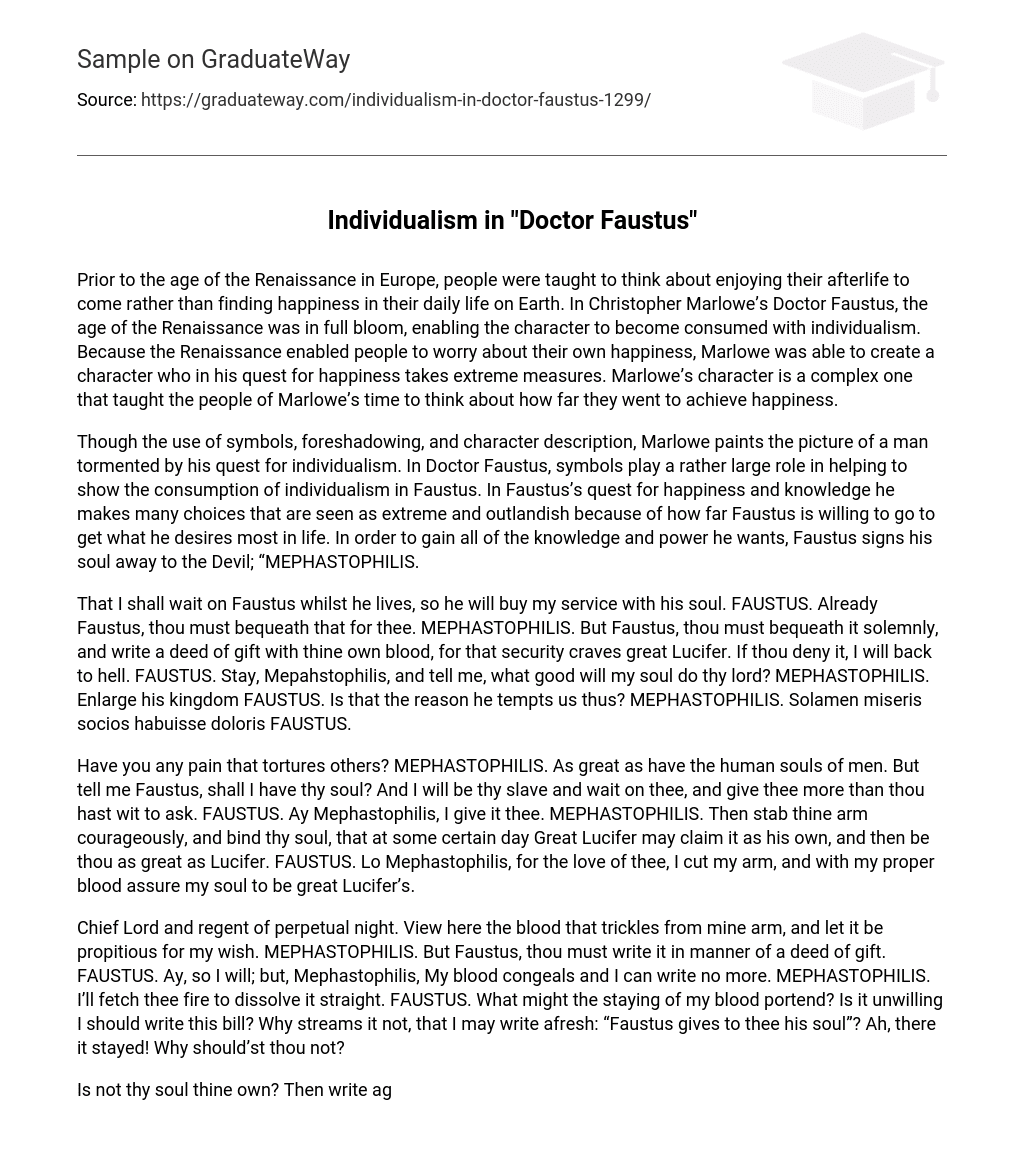Prior to the age of the Renaissance in Europe, people were taught to think about enjoying their afterlife to come rather than finding happiness in their daily life on Earth. In Christopher Marlowe’s Doctor Faustus, the age of the Renaissance was in full bloom, enabling the character to become consumed with individualism. Because the Renaissance enabled people to worry about their own happiness, Marlowe was able to create a character who in his quest for happiness takes extreme measures. Marlowe’s character is a complex one that taught the people of Marlowe’s time to think about how far they went to achieve happiness.
Though the use of symbols, foreshadowing, and character description, Marlowe paints the picture of a man tormented by his quest for individualism. In Doctor Faustus, symbols play a rather large role in helping to show the consumption of individualism in Faustus. In Faustus’s quest for happiness and knowledge he makes many choices that are seen as extreme and outlandish because of how far Faustus is willing to go to get what he desires most in life. In order to gain all of the knowledge and power he wants, Faustus signs his soul away to the Devil; “MEPHASTOPHILIS.
That I shall wait on Faustus whilst he lives, so he will buy my service with his soul. FAUSTUS. Already Faustus, thou must bequeath that for thee. MEPHASTOPHILIS. But Faustus, thou must bequeath it solemnly, and write a deed of gift with thine own blood, for that security craves great Lucifer. If thou deny it, I will back to hell. FAUSTUS. Stay, Mepahstophilis, and tell me, what good will my soul do thy lord? MEPHASTOPHILIS. Enlarge his kingdom FAUSTUS. Is that the reason he tempts us thus? MEPHASTOPHILIS. Solamen miseris socios habuisse doloris FAUSTUS.
Have you any pain that tortures others? MEPHASTOPHILIS. As great as have the human souls of men. But tell me Faustus, shall I have thy soul? And I will be thy slave and wait on thee, and give thee more than thou hast wit to ask. FAUSTUS. Ay Mephastophilis, I give it thee. MEPHASTOPHILIS. Then stab thine arm courageously, and bind thy soul, that at some certain day Great Lucifer may claim it as his own, and then be thou as great as Lucifer. FAUSTUS. Lo Mephastophilis, for the love of thee, I cut my arm, and with my proper blood assure my soul to be great Lucifer’s.
Chief Lord and regent of perpetual night. View here the blood that trickles from mine arm, and let it be propitious for my wish. MEPHASTOPHILIS. But Faustus, thou must write it in manner of a deed of gift. FAUSTUS. Ay, so I will; but, Mephastophilis, My blood congeals and I can write no more. MEPHASTOPHILIS. I’ll fetch thee fire to dissolve it straight. FAUSTUS. What might the staying of my blood portend? Is it unwilling I should write this bill? Why streams it not, that I may write afresh: “Faustus gives to thee his soul”? Ah, there it stayed! Why should’st thou not?
Is not thy soul thine own? Then write again: “Faustus give to thee his soul” (1. 5. 31-69). The one symbol that becomes rather clear that is important is blood. As Faustus signs away his soul to the Devil, his blood congeals, making it impossible for him to sign away his soul. As a reader it should become apparent that Faustus should have stopped when his blood would not allow him to physically sign away his soul. The blood also symbolizes the permanence of what Faustus has done on his quest for individualism. This symbol also becomes important in the final days of Faustus’s life.
Because Faustus signed his soul away to the Devil for what he considers to be his ultimate happiness, his pride gets in the way as he lays on his deathbed, seeing the blood of Jesus Christ run across the sky, which symbolizes sacrifice, and Faustus, blinded by his individualism and fear, is unable to repent and save his soul from damnation. During the play, foreshadowing is used in excess in order to show how Faustus’s quest for individualism will lead to his ultimate damnation. While blood plays a part as a symbol, it also plays a part in the foreshadowing for Faustus’s damnation.
Blood normally only congeals after a person has died, however Faustus’s blood was congealed as he went to go sign away his soul, foreshadowing his death and damnation. Another sign of foreshadowing appears on Faustus’s arm, after he signs his soul away. The words Homo Fuge which mean “Fly, man! ” appear on Faustus’s arm after selling his soul, which to any other human would mean that the situation they are in is not a beneficial one, however to Faustus, he is determined to achieve knowledge and power, thus he ignores the sign.
The last piece that completes Faustus as an individualist has to do with his descriptions and background. In the beginning of the play, the introduction tells the audience about how Faustus’s swelling pride will eventually lead to his downfall. Faustus is different than most characters of the time however, he is different because he is described as well educated and versed in many areas of society. Doctor Faustus is one of the first plays that truly focused on the plight of the individual rather than the plight of society as a whole.
Overall, Marlowe’s play was an epic piece that advanced the society because it enabled the people of the time that could read of course, to see how individualism can be both good and bad in society. In this case, it was mostly a horrible situation because Faustus was so consumed with his quest for knowledge, that he let his pride get the better of him, and that was eventually his downfall. ? Works Cited David, Alfred, and James Simpson. The Norton Anthology of English Literature. New York City: W. W. Norton and Company, 2006. Print.





